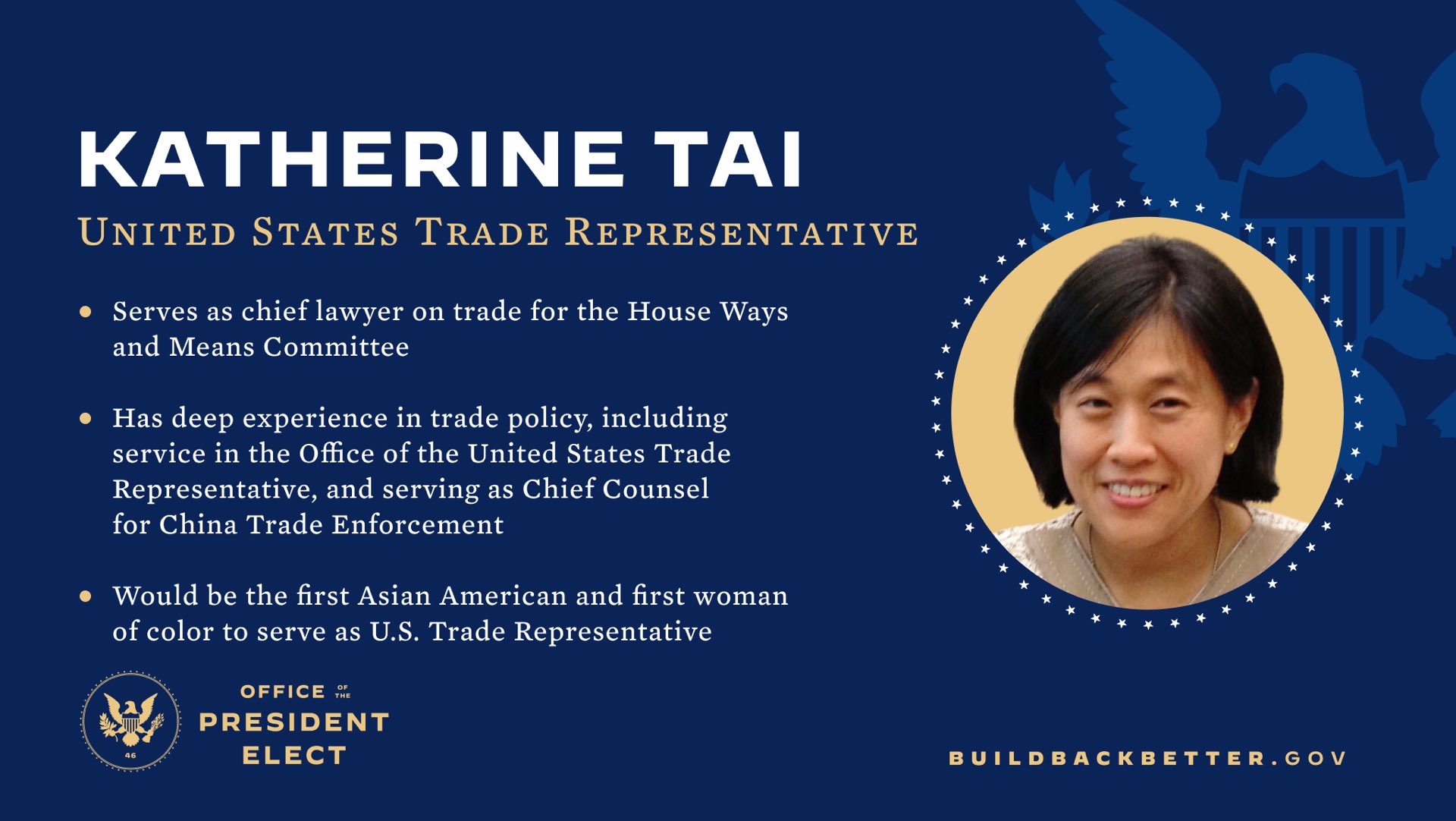This website uses cookies so that we can provide you with the best user experience possible. Cookie information is stored in your browser and performs functions such as recognising you when you return to our website and helping our team to understand which sections of the website you find most interesting and useful.
News
What Katherine Tai Means for Trade
President Joe Biden has tapped Katherine Tai, the lead advisor to the Chairman and Democratic Members of the Committee on Ways and Means, to be the next United States Trade Representative (USTR). Tai has spent a significant part of her career as a trade lawyer, including working in the USTR’s Office of the General Counsel as Chief Counsel for China Trade Enforcement with responsibility for the development and litigation of U.S. disputes against China at the World Trade Organization (WTO).
Tai, whose parents immigrated to the U.S. from Taiwan, will be the first woman of color to be USTR and the first staffer to become the lead trade negotiator without being a Deputy USTR previously. Ms. Tai is well-regarded and known for her straightforward, calm, and good-natured negotiating style. When asking Washington D.C. trade professionals about her, she’s commonly touted as “personable,” and one of the “best trade lawyers they know.” These compliments have come not only from both sides of the aisle, but also from the various stakeholders competing on the same issues—a rarity in Washington.
Despite being so highly regarded, her job will likely be challenging as she walks into a White House filled with a well-developed foreign policy team that has a deep knowledge of global trade and has worked closely with the president for years.
Tai was instrumental in negotiating and passing the U.S.-Mexico-Canada (USMCA) through Congress. She will now face Mexico’s government to assure it meets its obligations and enforce the trade pact measures she helped draft. Another tough issue will be fixing the Appellate Body of the WTO, which many believe has paralyzed the global negotiating agenda. U.S. critics feel the body wields its own set of rules, often disadvantaging Washington and ruling against U.S countervailing duties on countries accused of dumping in the U.S. market and harming U.S. manufacturers. Tai will be tasked with getting the U.S. back to the WTO table and convincing its members to rewrite the rules.
As the Biden administration advances its multilateral approach to trade, Tai will face significant policy hurdles. She will be in charge of re-establishing U.S. trade ties with allies and influence countries that have already started negotiating a number of trade deals that do not include the U.S, not to mention the issues involved with China. Biden has not yet indicated whether he will roll back former President Trump’s tariffs on China and the EU allies. Biden and Tai will try to reestablish trade relations with countries that have turned to trading more with China and reduce their reliance on the U.S.
Tai will be likely to go after China’s abuse of forced labor, state subsidies, and intellectual property abuses. And she will have an advantage being fluent in Mandarin and understanding Beijing’s aggressive trade practices.
Her confirmation hearing before the Senate Finance Committee was held Thursday, Feb. 25. During that hearing, she noted that regarding the U.S.-EU Boeing aircraft dispute and the resulting EU tariff on PVC: “Whether the tariff piece or the overall dispute is the need for the U.S. and EU to come together to figure out an answer.” She is expected to be confirmed quickly with bi-partisan support.


